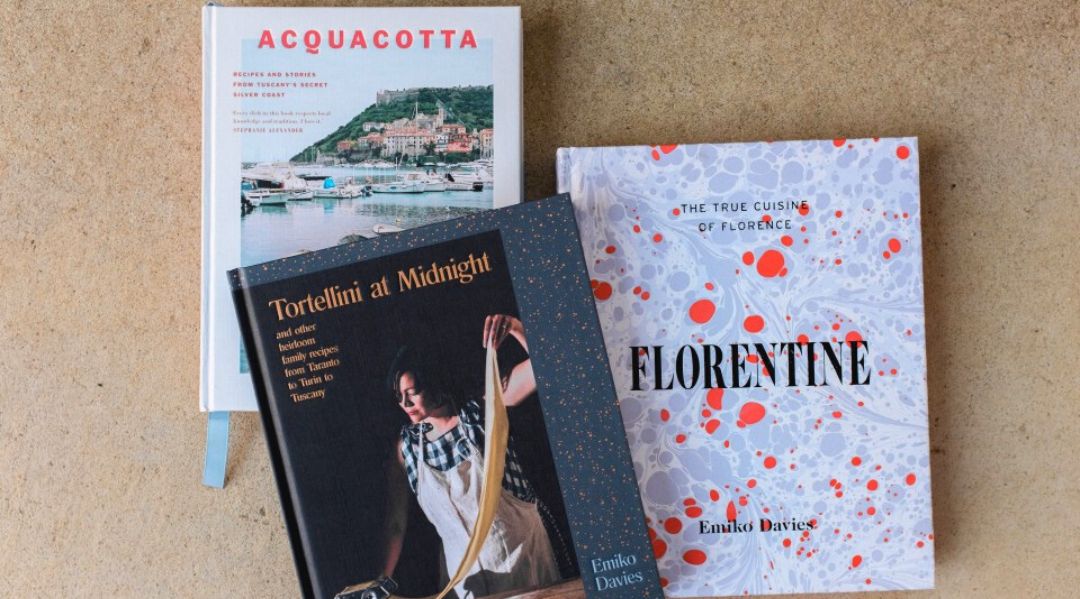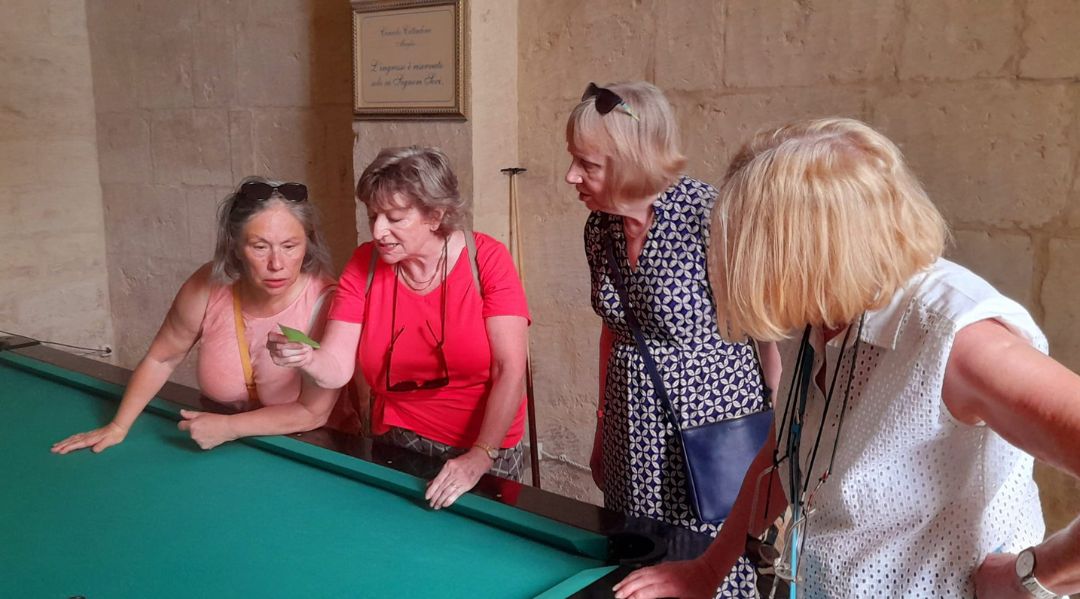
Mastering another language is a unique joy and if, like us, you love visiting the likes of Florence, Rome, Puglia and Sicily, then there’s hundreds of reasons as to why you should improve your Italian. Make holidays in Italy extra special by being able to make new friends, order your food in Italian, understand street signs and find your way around easily on local transport. Equally, learning a new language at home gives you something to focus on and has so many brain health benefits such as improving memory and problem solving.
Why should you improve your Italian on a Flavours Holiday
We are passionate about embracing all aspects of Italian culture and while there’s much to love, the Italian language is certainly one of the most beautiful aspects. That’s why we host language holidays in a range of Italian regions and cities including Amalfi, Sicily, Puglia, Tuscany and Bologna, where our experienced, native Italian tutors spend the week improving your Italian language skills, whatever your ability.
Like many language courses, our trips break down learning Italian into four key skills: listening and reading which are the receptive skills, and writing and speaking which are the productive skills. Many adults start their language-learning journey with only a few of these skills which can cause them to lose confidence quickly.
We truly believe – and see with our Flavours guests time after time – that immersing yourself in an authentic environment speeds up this process and helps you engage with what you’re learning. Not only do we cover all four skills back at the villa with written and vocal exercises, we visit nearby towns and put our newfound knowledge to the test, getting about, using street signs and speaking with real Italians. It’s the best way to learn!

What to expect on our Italian language holidays…
There are lots of other things that contribute to the success of our Italian language holidays, too. Groups are always kept small so that everyone is actively engaged by each other and the tutor, and we cater for all levels of experience, welcoming beginners as well as advanced Italian speakers. We also advocate popular aperitivo chat sessions at the end of the day to speak Italian over a lovely glass of vino! These informal chats as the sun sets have become somewhat of a legendary occurrence on our holidays, with returning guests citing not only how fun they are, but how a beautiful view and enjoying a drink helps them relax enough to let their new skills unconsciously flow.
Whether it be ordering in shops and restaurants, chatting in Italian to fellow guests, or simply repeating phrases to yourself while doing breaststroke up and down the villa pool, it’s a long way from turning up at a cold UK classroom one evening week and trying to remember what you learned the week before.
So, if you’re preparing to come on one of our Italian language holidays or perhaps preserving the lingo you mastered there, we’ve got loads of tips from our tutors on how to build on the work you have already done and improve your Italian at home. Here, we break down our advice into the four skill types, with lots of ideas on how to keep your brain whirring!
How to practise speaking Italian:
Speak to yourself in Italian
First, let’s keep things simple. As you mooch around the house, perhaps doing some chores, try and describe what you’re doing in Italian. It’s important to use your voice – and confidently, too, don’t be embarrassed to try the accent! – and talk out loud to yourself as much as possible. Count as high as you can, repeat all of your favourite phrases, pretend you are ordering in a restaurant and even talk out both sides of an imaginary conversation. Your home is your safe space, so use time on your own to keep reiterating everything you already know and secure that muscle memory.
Practise every day
This is incredibly simple and potentially quite obvious, but if you want to improve your Italian you really need to dedicate time to it every single day. This tip applies to all four skill areas, but speaking is the easiest way to do this as no materials are required – you can just speak out loud!
If you dream to improve your Italian, record yourself
So, you felt nervous to talk to yourself? Well, don’t shoot the messenger for this one! It might make you cringe ever so slightly, but recording yourself speaking Italian is one of the most impactful ways you can improve. We are certain that after doing this you will immediately notice words you struggle with, ways to hone your accent and the areas in general that need work. It’s an incredibly effective tool and we recommend doing it continuously as you learn new phrases.
Find an Italian language partner
Even better than speaking to yourself is, of course, talking with a partner who is also learning Italian, or perhaps a native Italian speaker who would like to practise their English. In this instance, your partner can correct you and offer pointers which is really helpful and the great thing about scheduling in a weekly chat like this is that you’re pushed to stick with it. For example, if you intend on practising your Italian while running the hoover around but something gets in the way or there’s something else on your mind, it’s easy to brush over.
With a buddy, you will also feel the pressure to keep practising even when you’re not with them, so that the conversation is better. Tandem is an app which connects those looking to practise a language in-person, while the website My Language Exchange puts you in touch with a partner from anywhere in the world to organise a video call.
Read and repeat
Choose something appropriate for your experience level and simply read and repeat out loud. You may not even understand what you are reading at first, so once you’ve given it a go and grappled with pace and pronunciation, translate so that you can try again. Keep going until you feel comfortable sounding out each word in your mouth and if you get stuck, Google’s translate function will show you how to pronounce anything you’re unsure of.
Sing along
There are so many brilliant Italian musical artists and one way to grow your confidence when speaking Italian is to sing it, instead! Choose an album you like the sound of and try reading through the words as you sing them out loud. After a while you’ll start to remember the songs by yourself and it will sky-rocket your self belief as your brain becomes more comfortable with hearing you try Italian words and practise your accent. Remember, half the battle is confidence!
Try an app
There are lots of apps that offer different ways to practise speaking Italian but one of the best rated is Glossika. Glossika covers all four skill areas but is particularly praised for its research in ensuring that every single sentence has been reviewed and recorded by a native speaker. Users are asked to carefully repeat after the natives and then record themselves to hear how their accent improves over time. Another highly rated app is Speechling which is 100% focused on nailing your pronunciation, offering side-by-side comparisons of your voice with a native speaker’s, followed by feedback from your assigned coach (always a native speaker) within 24 hours of your lesson.
Think like an Italian
One of the ways you know you’re really getting it, is when you stop translating from English to Italian in your head before speaking. This takes time and practice but if you consciously try to think of the words and speak internally in Italian you will become fluent quicker and it will cut down stammering while you’re attempting to speak.

How to practise listening to Italian:
Watch Italian TV shows
Get into an Italian TV series and tune in every couple of days or every week. You will be consistently challenged with new dialogue but characters will stay the same and therefore recognisable enough for you to keep your bearings. If you’re looking for something to watch, Netflix has a new series out called La Legge Di Lidia Poet, which means The Law According To Lidia Poet. Set in Turin in the 1800s, it follows a beautiful, young lawyer, Lidia, who also happens to be the country’s first female to graduate in her profession. After she attempts to solve a mysterious murder, complaints from her male peers have her disbarred, but she’s set on challenging the ruling. It’s a stunning watch with sweeping views, period costumes and clear dialogue using lots of everyday words and phrases.
Improve your Italian by watching an Italian film
The difference between tuning into a TV show and enjoying a film is that while you might be hard-pressed to re-watch the whole 10 episodes of a series, it’s easy enough to replay the same film at least once more, or even put it on in the background while doing some housework. The idea is that every time you watch it you become more familiar with the vocabulary used, enough to remember it long-term. If you’re unsure of which films to try, La Vita E Bella (Life is Beautiful) is a classic and very easy to follow, while The Great Beauty from 2013 is beautifully shot with elements of dark humour and can be found on Netflix.
Listen to an audio book
Audio books are brilliant if you want to improve your Italian because while you might not always have the time to sit down and devote an hour to reading, an audio book can play in the background and allow you to breeze in and out, and at the very least help your mind become more familiar with Italian sounding words and pronunciation. Especially if you’re still new to learning an additional language, we suggest listening to a book you have already read and enjoyed in English. This gives you just a little advantage and ensures that you will actually be interested in the content.
Listen to ‘slow news Italian’
This is a favourite tip of Flavours founder Lorne who says that listening to the news slowly in Italian can be an enjoyable, educational way to practise hearing Italian words – and it’s quite relaxing, too! But this isn’t an idea that popped out of thin air or required Lorne to put her news station on slow-mo, there’s actually a website and app dedicated to reading the news slowly enough for beginners to understand. Take a look at ‘News in Slow Italian’ and there’s different levels to suit your experience.
Use YouTube for common conversations
YouTube is full of videos from a huge host of language tutors providing free dialogue for beginners to listen to. For example, the YouTube channel, Learn with Italian Pod 101, has a whole 30-minute segment which works through conversations in Italian. As a listener, you are instructed by text on the screen when to listen and answer questions out loud, but it is quite challenging as the conversations run for a good while and speak at a relative speed. There are lots to choose from if this one is too advanced for you, but it’s a good one to try.

How to practise reading Italian:
Head outside in Italy
On our language holidays in Italy we take guests out on excursions to local towns to give them the opportunity to practise reading Italian. Doing this in a real-life setting is so important as it actively engages your brain and you know that you can’t just turn the page of the textbook and get the answers. Menus, street signs, shopping, guide books – all of these things crop up naturally when roaming the quaint towns of Florence or Amalfi, where Flavours holidays are set.
Find articles that interest you
Practise your reading with short sections of text that interest you, for example, a news article, blog, or short story. Read it several times, engaging your brain actively. Wait until the end to look words up, resisting the urge to stop-start all the way through to do this. If necessary, jot down words you’re not sure about as you read. With practice, you’ll guess meanings from the context, as you do in English.
Listen and read at the same time
We previously mentioned that audio books are a great way to familiarise yourself with Italian pronunciation casually, but if you have the time, listening along while also physically reading one of your favourite books in Italian will deliver even better results. Choose a title you love and will engage you, and try and take in every word by sounding it out on the page.
Use flash cards to improve your Italian
Write out useful phrases, basic grammar and commonly used verbs and nouns on flash cards and ask a friend or a partner to test you regularly. The idea is that when you see the card you should be able to confidently read its meaning and then explain this in Italian first, before reiterating in English to solidify your knowledge and ensure that your friend can check your answers.

How to practise writing Italian:
Play a game
With a friend or language partner you can try this simple children’s game which sees each person make up the next sentence in the story. Go around in a circle and write out your leg of the story, following on from the person in front of you. Once the page is full, read it out and start again. This will challenge your problem-solving skills, force you to be imaginative and spontaneous and lead to more unusual vocabulary than what you might be used to as a tourist.
Get an Italian pen pal
This is another form of language partnering but instead of sitting down for a chat once a week, write a letter instead. My Language Exchange and Global Pen Friends both make it incredibly easy to find an Italian native to write to, which you can do old-school with pen and paper, or via email. Many Italian people on these sites will be hoping to write to you in English, so it’s a way of helping each other out.
Be a copy cat
Learning how to write some of your favourite quotes and phrases is a sure-fire way to build your confidence in writing. You might find it intimidating to think about what you want to say and then spell it correctly, so make things a little easier for yourself by learning the spellings of words you already know and like, by heart. Copying out a story or article might be long-winded, so why not choose a different poem every day and copy it out at least three times with the aim of remembering it? Test yourself the following day before learning a new one.
Look up words you don’t know after writing
Invest in a good dictionary. But while writing, don’t keep stopping to look up words. If you don’t know a word, write it down and look it up later. It’s best to get the flow and structure going smoothly, then you can spend some time brushing up on your vocabulary afterwards. When you do, though, that’s a good time to make some notes and flash cards to ensure that you can test yourself.
Start a journal to improve your Italian
Even if you only take five minutes every evening to write about your day using simple sentences, this daily ritual will no doubt help you think and write in Italian. There’s no need for long prose or sonets, just explain what happened in your day; where you went, who you saw, what you had for dinner – that kind of thing. Get into the habit of doing this every morning or evening and you’ll see that the consistency of this act makes a big difference.









Thank you so much for these tips. Many of them I have seen before, but had forgotten, and others were new. I’m looking forward to my second Flavours Language holiday in the autumn.